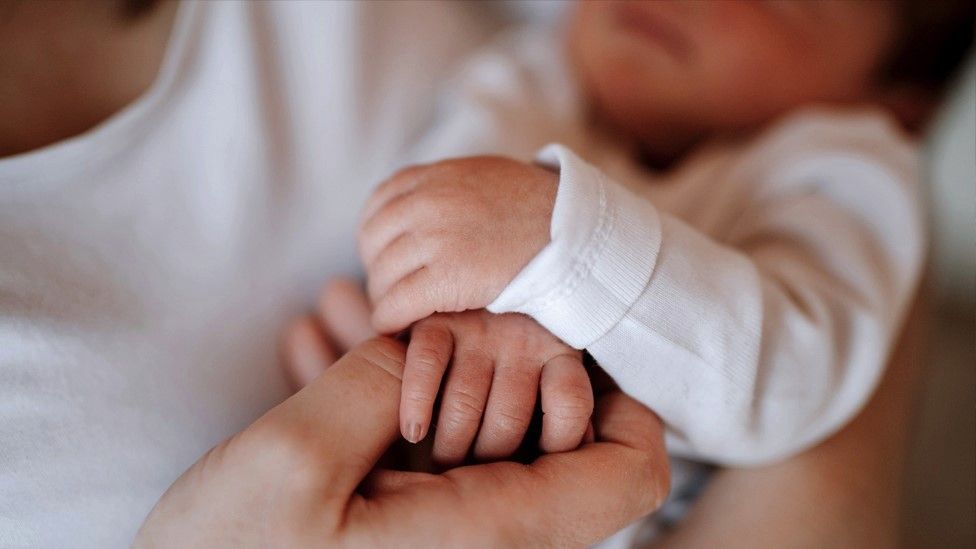Forced adoption: Birth parents urged to give evidence to inquiry
- Published

Parents forced to give up their babies for adoption in the 1950s, 60s and 70s are being asked to come forward to give evidence to a new investigation.
The Joint Parliamentary Committee on Human Rights is to hold an inquiry into the forced adoption of babies of unmarried mothers during those years.
Committee chair Harriet Harman says it is a matter that affects the human rights of thousands of women.
One mother said she was told: "You won't be seeing this baby again."
The affected mothers said they were made to hand over their babies by doctors, nurses, social workers and churches.
The Scottish government is also examining the issue of forced adoptions after reports by the the BBC. Birth mothers have held a series of meetings with Scottish government officials to discuss the issue.
News of the inquiry comes after the BBC reported on the issue earlier this year. In the five months since, dozens of other birth mothers, birth fathers and their children have come forward to tell their stories.
Yvonne Labrum was 19 when she became pregnant with Andrew Conant's baby in 1974. He was 18 and had just left the Navy. The couple were in a relationship.
Yvonne says her father was extremely angry and banned Andrew from seeing her.
But she says the worst moment came when she'd given birth and she had to deal with maternity hospital staff and a social worker appointed to her case.
"It all had to be kept hush-hush," says Yvonne. "You're not married, therefore you're not keeping the baby. Which really hurt me.
"I was treated with contempt. They took my baby from me and wouldn't let me hold her."
She had given birth to a daughter, later named Liz Harvie.
"I needed stitches after my delivery, but I was left alone in a room for two hours without stitches," she says. "I was like a slab of meat on a table."
Andrew, meanwhile, was refused entry to the hospital and it was decades before he met his own daughter.
Yvonne says a few days after the birth, a social worker put pressure on her to sign an adoption consent form, but then tricked her when it was time to hand the baby over.
"She (the social worker) asked to hold my baby and said she would hand her back. But she didn't. She just said 'you won't be seeing this baby again' and walked out," says Yvonne.
It would be another 29 years before Yvonne and Andrew would be reunited with Liz.
Andrew says: "It hurt not seeing my baby daughter. I've had other children and they have all missed out on having a relationship with Liz."
Liz Harvie was taken from her birth mother, Yvonne, as a child
Liz was told she was adopted and had a happy upbringing - but she was always anxious to trace her birth parents and try to understand why they had given her up.
"I was confused and angry, yes, that I had been put up for adoption," she says. "I felt abandoned."
It was Liz who instigated the search for Yvonne and Andrew, bringing them together for a reunion.
They have all now given their backing to a campaign seeking to get an official apology for forced adoption.
Liz says while this "wouldn't take away the pain, it would certainly help".
It's not known how many babies were taken from their birth parents in this way.
Around 500,000 babies were adopted in England and Wales between 1945 and 1975, according to the Office for National Statistics.
Academics have suggested that the majority of these babies would have been born to unmarried parents, given the taboo of getting pregnant outside of wedlock that existed at the time.
Dozens of other unmarried birth mothers who were involved in forced adoptions have told the BBC what they went through.
One said a midwife refused her pain relief during birth and called her "wicked" for getting pregnant.
Another said she was left alone on a hospital bed for four hours unable to reach her screaming baby. And one woman claimed her social worker used coercion to get her to sign an adoption consent form.
The UK government says it accepts that forced adoptions did take place, but that the blame lies with society and its attitudes at the time. It adds that adoption services are much better now.
Labour MP Harriet Harman says her committee is calling for birth mothers, birth fathers and their children to come forward with a view to giving evidence, either written or in person.
She says this is a matter that affects the human rights of thousands of women and that the committee wants to hear as wide a range of evidence as possible.
Related Topics
- Published27 May 2021
- Published26 May 2021